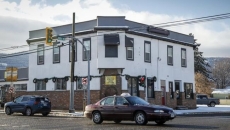MONTREAL - The recent death of a Montreal man from probable hypothermia as he tried to cross into the United States has exposed the dangers of irregular border crossings, which appear to be rising on both sides of the Canada-U.S. border.
The body of 44-year-old Fritznel Richard was found in a wooded area south of Montreal last week; he had been trying to reach family in the United States, Quebec provincial police said. Experts say his death highlights the need for Canadian and United States authorities to remove regulatory barriers to migration so people don't need to use irregular crossings.
Poverty, economic instability, and disruptions due to climate change are pushing an increasing number of people to seek security in places such as Canada and the United States, says France-Isabelle Langlois of Amnesty International Canada's French-language division.
"This rise in inequality between the North and South prompts a rise in insecurity, in violence — that means that people are more pushed to find a place where their future and that of their children will be better," she said in a recent phone interview.
Most people who cross the Canada-U.S. border at unofficial points, such as Roxham Road south of Montreal, are heading north to claim asylum because Canada is seen as more welcoming to immigrants than is the United States, she said. But the smaller number heading south must take routes that are more "perilous" because, unlike Roxham Road, there's no irregular crossing point into Canada that's easy to access.
Between January and November last year, RCMP intercepted nearly 34,800 people who tried to cross into Canada from the United States between official ports of entry. In contrast, the total number of interceptions in 2021 was 4,246, when the COVID-19 pandemic led to the closure of Roxham Road — a popular unofficial crossing spot for people avoiding being subject to the Canada-U.S. Safe Third Country Agreement.
That agreement forces asylum seekers to make a refugee claim in the first "safe" country they reach. In practice, it means that border officials in Canada turn back would-be asylum seekers who show up at official checkpoints from the U.S.
Authorities, however, are not required to turn back asylum seekers who cross irregularly at places such as Roxham Road.
While tens of thousands of would-be refugees are trying to get to Canada, anecdotal data from the U.S. suggests that a smaller but growing number of people are trying to cross the other way.
The chief patrol agent for Swanton Sector, which patrols Vermont, New Hampshire and eastern New York, tweeted at the end of December that border patrol has encountered more illegal border crossers in the past three months than the entire previous year.
Those intercepted in December, the agency said, included a family and three young children from Mexico attempting to cross a wooded area in near-freezing temperatures, and a citizen of Haiti who collapsed from hypothermia following a crossing in North Troy, Vt.
Frantz André, a spokesman for a Montreal-based group that helps undocumented people, says he knows 10 people or families in the past year who have tried to cross the border into the United States.
He says the rising cost of living in Montreal, a shortage of immigration lawyers to help asylum seekers with their files, and trouble obtaining work permits in a timely manner are a few of the reasons people choose to leave.
Richard's story, he said, illustrates that problem.
André said Richard was originally from Haiti and came to Canada on a journey that included stops in Brazil and the United States before he crossed at Roxham Road. However, difficulties in obtaining a work permit and a high cost of living pushed him to the United States, where his wife had already gone.
When he died in late December, he had been trying to reunite in the U.S. with his wife and 19-month-old son, as well as an 11-year-old son in Haiti, said André, who is helping the family organize a funeral.
"He came here seeking help, trying to get to new life, and he thought Canada would have been the new home," he said in a recent phone interview.
Julie Young, a geography professor who holds the Canada Research Chair in critical border studies at the University of Lethbridge, says the rise in irregular crossings comes as the United States and Canada have put in place measures to make it increasingly difficult for people to migrate safely and legally.
Young says that rather than stem the flow of migration, restrictive immigration policies can drive people directly into the hands of smugglers, or push them to cross in dangerous and more remote places.
"If you're desperate to get across the border and try to find safety and security for yourself and your family, you may not have a sense of what the potential risks are and the risks might seem worth it," she said.
Young, Langlois and André all said they believe that the only way to prevent deaths is to provide more safe and legal pathways for people to migrate, including by suspending or reviewing the Safe Third Country Agreement.
In the long run, Langlois said, it's also up to everyone to work to reduce the global inequality and insecurity that pushes people to migrate in the first place.
All three agree that criminalizing asylum seekers or putting in place rules to stop their arrival are unlikely to work.
"If someone is ready to try their luck by putting their safety, their life in play, it's because they don't have anything else to lose," Langlois said.






